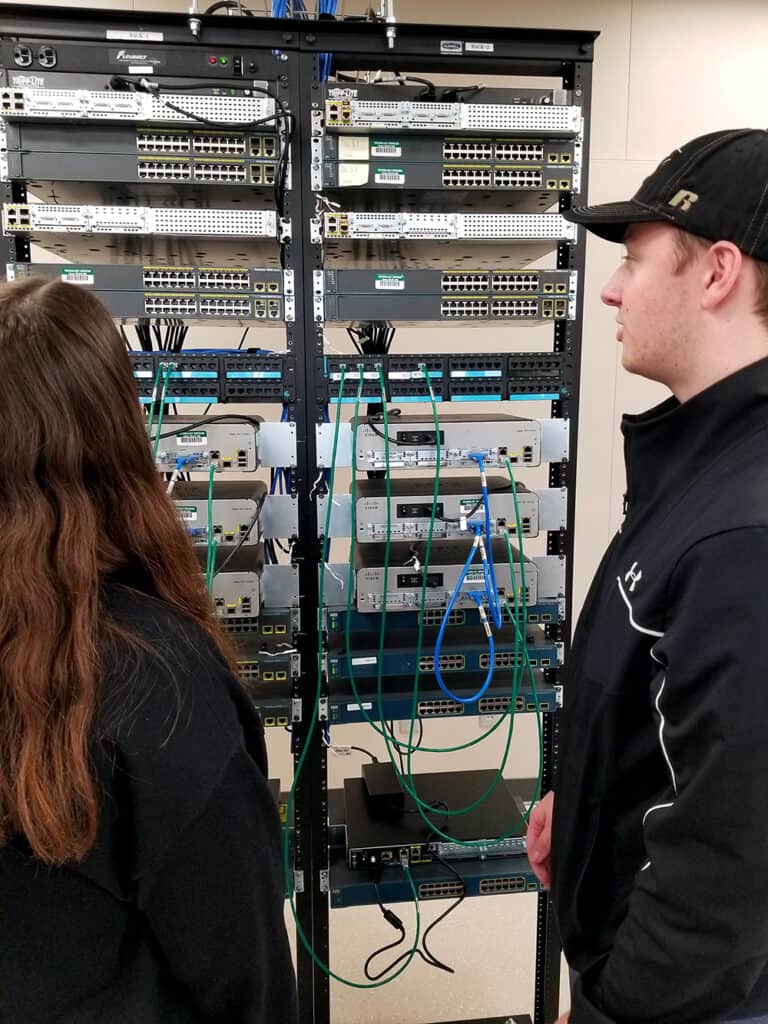Program Overview
The BSAS in Information Technology program at Youngstown State University (YSU) prepares students with a strong foundation in computational sciences with a focus in the fields of IT. The coursework spans from ‘General Programming’ to ‘Database Management Systems’, providing learners a comprehensive understanding of the IT industry.
Students also gain practical exposure through various industry-relevant projects, which helps in developing exceptional problem-solving abilities and critical thinking skills required in today’s competitive landscape.
IT graduates of the AAS degree program may continue their studies towards a bachelor’s degree in a computer or information technology area or may obtain full-time employment as a database specialist, help desk support, network technician, web/digital designer, and in other closely related fields.
IT graduates of the BSAS degree program may obtain full-time employment as web & multimedia designers/developers, network administrators, computer programmers, application developers, database managers, computer systems analysts, cybersecurity specialist, and in other closely related fields.
Graduates of the associate degree program can pursue careers in service and support of information systems, as well as continuing on to a bachelor’s degree in information technology. This degree may be earned in four semesters if students average 15-16 hours per semester.
The program supports work processes and employee performance enhancements; is designed to improve overall workgroup and individual productivity; and addresses the creation, distribution, storage, and use of information in all its states. Business processes are incorporated as an integral part of all course content. Information Technology encompasses:
The 4+1 graduate track may be earned in eight semesters if students average 16 hours per semester.
The Information Technology 4+1 program leads to the degree of Master of Computing and Information Systems. The flexibility of the program allows the student many choices.
This degree may be earned in ten semesters if students average 16 hours per semester during the first 4 years and 11 hours semester during the last year.
- CSIS 3782: Cisco Networking Academy 1
- CSIS 3783: Cisco Networking Academy 2
- CSIS 3784: Cisco Networking Academy 3
- CSIS 2620: System Configuration and Maintenance
- CSIS 3755: Information Assurance
- CSIS 3756: Security Design
- CSIS 3723: Networking Concepts and Administration
- CSIS 3722: Development of Databases
Speak to a Faculty Member
Dr. Abdu Arslanyilmaz
Professor, BSAS in Information Technology
aarslanyilmaz@ysu.edu

The STEM community has a variety of student professional organizations that allow you to grow and foster your learning in an environment with those who share the same interests.
Student professional organizations provide opportunities for you to meet experienced professionals, collaborate with students at other universities, or form relationships with colleagues outside the classroom. They provide social, academic, entrepreneurial, and professional networking opportunities.
Each year, thousands of dollars in scholarships are awarded to students enrolled in the College of Science, Technology, Engineering, and Mathematics. Scholarships come from a variety of sources, vary in amount, and are available to both incoming and current STEM students. Below, you will find further information regarding the opportunities that may be available to you through the STEM College.